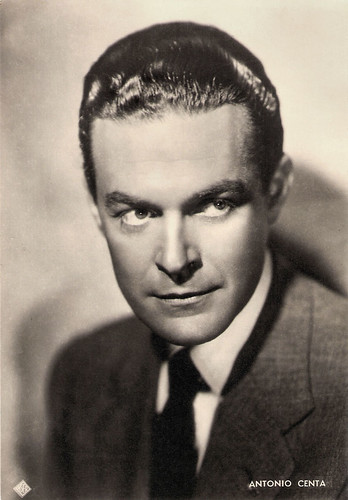
Italian postcard by ASER, no. 100. Photo: Italcine / Foto Ciolfi.
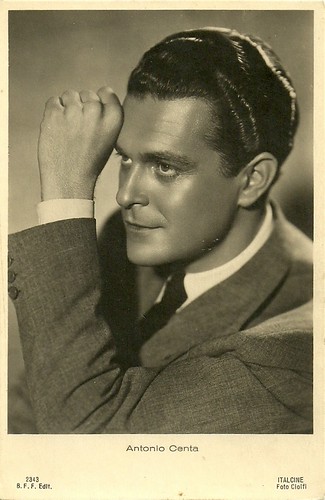
Italian postcard by B.F.F. Edit. (Ballerini e Fratini, Florence), no. 2343. Photo: Italcine / Foto Ciolfi.
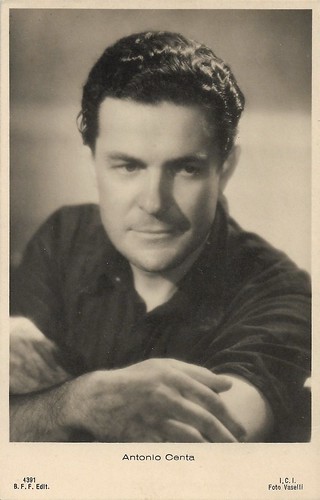
Italian postcard by B.F.F. (Ballerini & Fratini Florence) Edit., no. 4391. Photo Vaselli / I.C.I.

Italian postcard by B.F.F. (Ballerini & Fratini Florence) Edit., no. 4478. Photo by Vaselli / Lux Film. Antonio Centa in Zazà (Renato Castellani, 1944).
P.A. of Primo Carnero
Antonio Centa was born in Maniago, Province of Pordenone, in 1907. During the First World War, his family moved to Ferrara in the Friuli region. Antonio grew up in the world of ceramics and also started his career here. In 1929 he emigrated to the USA, where he first worked as a ceramist and later worked as the personal assistant of the famous boxer Primo Carnero, who also came from Friuli. Back in Italy, the bright and charming young man was offered the chance to work in the Italian cinema. He appeared in La luce del mondo/The Light of the World (Gennaro Righelli, 1935). Then, director Gustav Machatý gave him a bigger role in Ballerine/Dancers (1936).
He had his breakthrough with the propaganda film Lo squadrone bianco/White Squadron (Augusto Genina, 1936). From then on, he became one of the most active and notable actors. He was especially popular with the female audience and was the film partner of such divas as Assia Noris, Alida Valli, Isa Miranda, Doris Duranti, María Denis, and Vivi Gioi.
He appeared in the Telefoni Bianchi comedy La contessa di Parma/The Countess of Parma (Alessandro Blasetti, 1936) opposite Elisa Cegani, the propaganda drama Sotto la croce del sud/Under the Southern Cross (Guido Brignone, 1938), set in Italian-occupied Abyssinia following the recent Italian victory there, and another White telephone comedy, Una moglie in pericolo/A Wife in Danger (Max Neufeld, 1939) with French actress Marie Glory.
With his ironic air, he often embodied the role of the antagonist of the hero. He was thus the rival of Fosco Giachetti in the drama Fari nella nebbia/Headlights in the Fog (Gianni Franciolini, 1942), and of Andrea Checchi and Gino Cervi in Gente dell'aria/Air People (Esodo Pratelli, 1943). Centa had critically acclaimed performances in Renato Castellani's films Un colpo di pistola/A Pistol Shot (1942) with Assia Noris, and Zazà (1944) with Isa Miranda and based on a script by Alberto Moravia.
In 1939 Centa was forced to lend his voice to his colleague Osvaldo Valenti in the film La vedova/The Widow (Goffredo Alessandrini, 1939). The part had originally been assigned to him, but at the last moment, it was offered to Valenti although Centa had already the contract in his pocket. Centa was punished for having undermined the mistress of a powerful fascist.
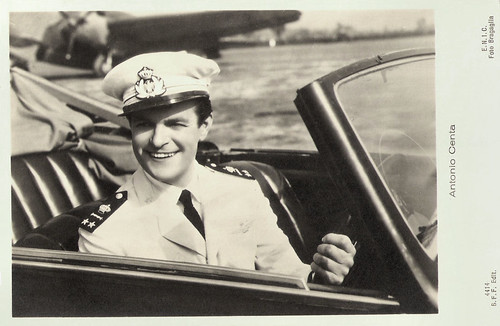
Italian postcard by B.F.F. Edit, no. 4414. Photo: E.N.I.C. (Ente Nazionale Industrie Cinematografiche) / Foto Bragaglia.
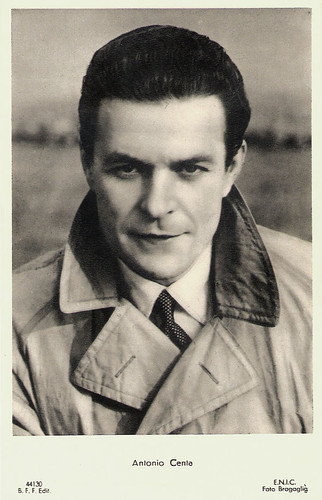
Italian postcard by B.F.F. Edit., no. 44130. Photo: Bragaglià / E.N.I.C.
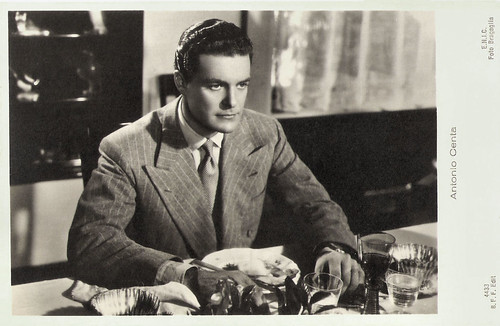
Italian postcard by B.F.F. Edit., no. 4433. Photo: Bragaglia / E.N.I.C.
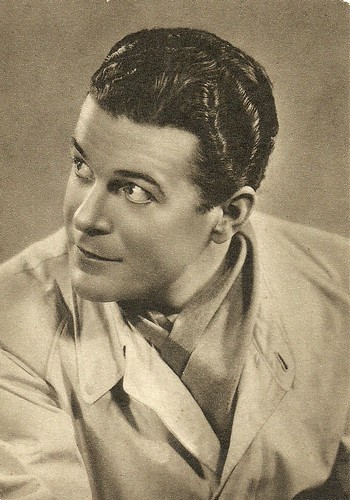
Italian postcard. Photo by Luxardo, Rome. Commissioned by Melloni, Bologna. Printed by Pizzi & Pizio, Milano.
The absolute gentleman loser
Antonio Centa’s film career broke off in 1943 when the Second World War almost halted the Italian film industry. After the war, his success declined. Italian Wikipedia suggests that the reason that he got fewer leading roles was either a change in the taste of the Italian audiences or the fact that Centa’s weight had become a bit heavy.
He played leading roles in films like the drama Assunta Spina (Mario Mattoli, 1948) with Anna Magnani, and Ombre sul Canal Grande/Shadows on the Grand Canal (Glauco Pellegrini, 1951), where he finds Isa Pola, but gradually he started to be cast in supporting roles, such in the historical-adventure film Il cavaliere misterioso/The Mysterious Cavalier (Riccardo Freda, 1948) with Vittorio Gassman, and the British-Italian coproduction The Glass Mountain (Henry Cass, 1949).
He could be seen in memorable films like the thrilling French-Italian drama Le salaire de la peur/The Wages of Fear (Henri-Georges Clouzot, 1953) and Una vita difficile/A Difficult Life (Dino Risi, 1961) as the tour leader and mature suitor of Lea Massari.
One of his last films was the comedy La pecora nera/The Black Sheep (Luciano Salce, 1968), starring Vittorio Gassman. In the late 1960s, Centa retired from the cinema and returned to Ferrara, where he ran a restaurant for a while.
Gloria De Antoni and Oreste De Fornari directed a documentary about him, Il perdente gentiluomo: vita e arte di Antonio Centa (The Absolute Gentleman Loser. Life and art of Antonio Centa) produced by the Cineteca del Friuli. Antonio Centa died in 1979, after a car accident near Rovigo, Italy.

Italian postcard by Ed. Vecchioni e Guadagno, Roma. Card for Cinema Teatro Impero, Siena. Photo: Mediterranea Film.Antonio Centa in the Italian colonial propaganda film Sotto la croce del sud (Guido Brignone, 1938), partly shot in Ethiopia.
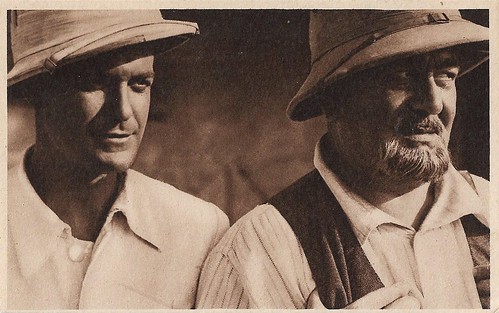
Italian postcard by Ed. Vecchioni e Guadagno, Roma. Card for Cinema Teatro Impero, Siena. Photo: Mediterranea Film.Antonio Centa and Giovanni Grasso in Sotto la croce del sud (Guido Brignone, 1938).
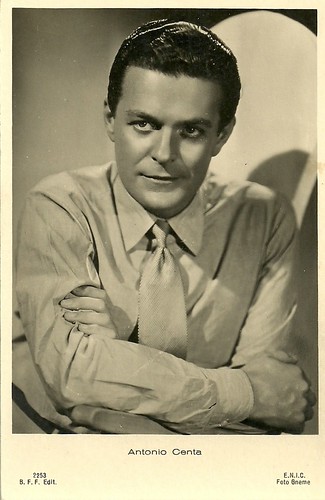
Italian postcard by B.F.F. Edit. (Ballerini e Fratini, Florence), no. 2353. Photo: ENIC / Foto Gneme.
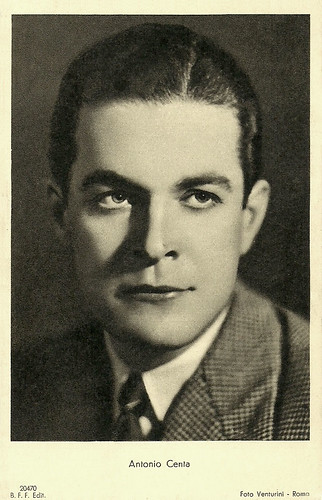
Italian postcard by B.F.F. Edit. (Ballerini e Fratini, Florence), no. 201470. Photo: Venturini, Rome.
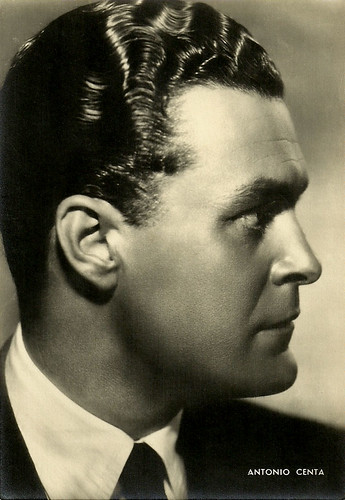
Italian postcard by ASER (A. Sermiglia Ed. Roma), no. 19. Photo: Ciolfi / Italcine.
Sources: Messagero Veneto (Italian), Wikipedia (Italian and English), and IMDb.
This post was last updated on 13 September 2023.
No comments:
Post a Comment